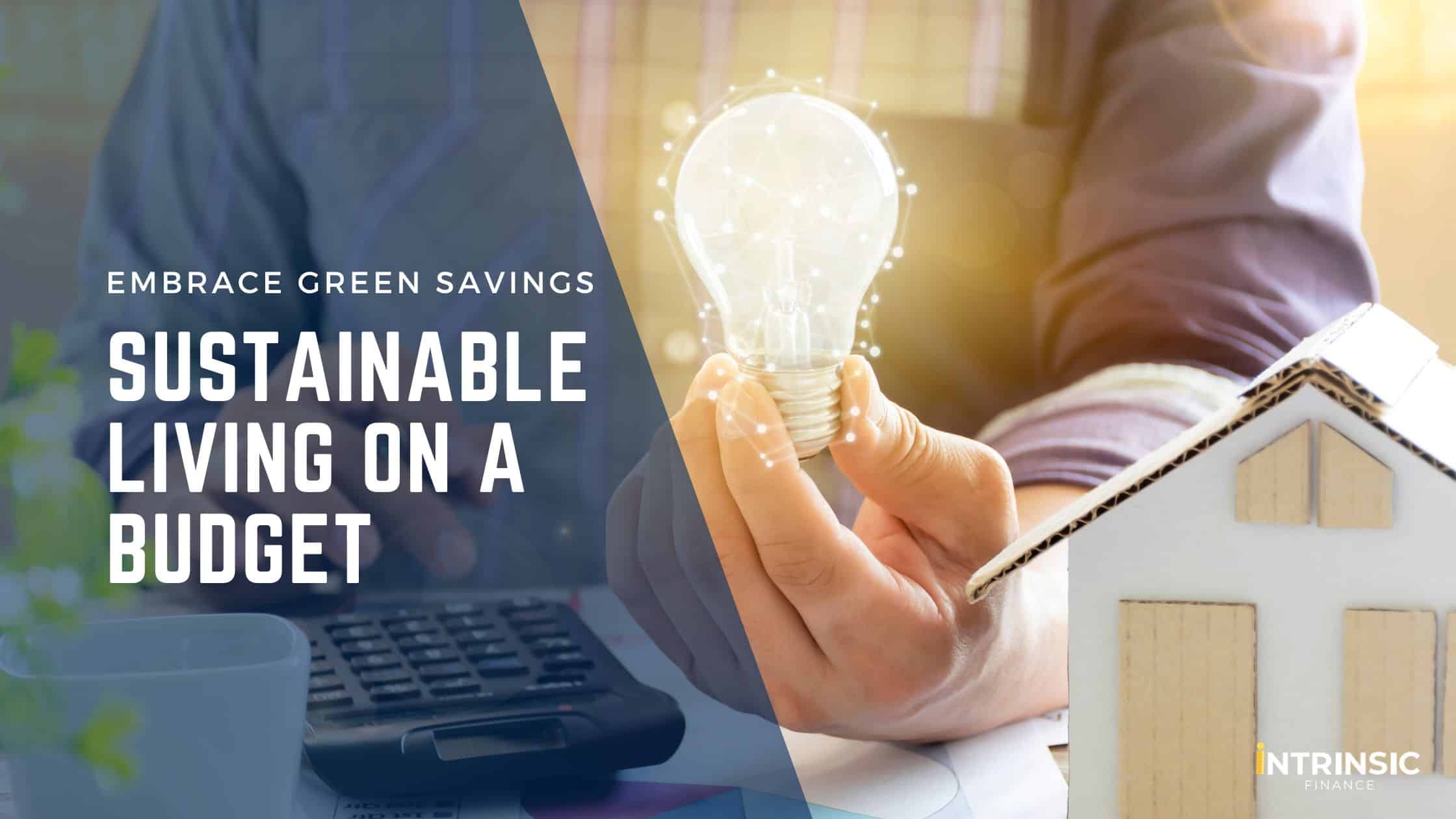You don’t need a green thumb or a fat wallet to live sustainably. Contrary to popular belief, eco-friendly choices can save you money. This guide will show you how to adopt sustainable practices without breaking the bank. We’ll explore practical tips to reduce energy consumption, minimise waste, and live greener lives. And if you’re considering car financing in Australia, explore options like Intrinsic Finance for flexible and tailored car financing solutions.
What is Sustainable Living?
Sustainable living is a lifestyle that aims to minimise our negative impact on the planet while improving the quality of life for both current and future generations. It’s about balancing meeting our needs and preserving the environment for years to come.
Key principles of sustainable living include:
- Reducing resource consumption: Using less water, energy, and materials to decrease our ecological footprint.
- Minimising waste: Reducing, reusing, and recycling to divert waste from landfills and conserve resources.
- Promoting renewable energy: Adopting clean energy sources to reduce greenhouse gas emissions.
- Supporting sustainable agriculture: Choosing organic and locally sourced food to support healthy ecosystems and reduce carbon emissions from transportation.
- Conserving biodiversity: Protecting plants, animals, and their habitats.
- Fostering community and equity: Building strong communities and promoting social justice.
1. Energy Efficiency
Reducing your energy consumption is one of the most effective ways to save money and help the environment. By making conscious choices about how you use energy, you can significantly lower your utility bills and reduce your carbon footprint.
- Auditing Your Home: Take a walk through your home and identify areas that might be wasting energy. Check for drafts around windows and doors, which can lead to heat loss in winter and heat gain in summer. Inspect your attic and walls for adequate insulation. Older homes might have outdated appliances that consume more energy than newer models. Consider hiring a professional energy auditor for a comprehensive assessment.
- Energy-Efficient Appliances: Upgrading to energy-efficient appliances can yield substantial savings over time. Look for appliances with Energy Star labels, which indicate that they meet strict energy efficiency guidelines. While the initial cost might be higher, the long-term savings on your utility bills often outweigh the upfront investment. Consider replacing older refrigerators, dishwashers, washing machines, and dryers with newer, energy-efficient models.
- Smart Thermostats: Smart thermostats offer advanced features that help optimise energy consumption. These devices learn your heating and cooling preferences and create customised schedules to maximise efficiency. Some models even allow you to control your home’s temperature remotely. By using a smart thermostat, you can reduce energy consumption by up to 15%.
- Lighting Upgrades: Switching to energy-efficient lighting is a simple yet effective way to cut energy costs. LED (Light Emitting Diode) and CFL (Compact Fluorescent Light) bulbs use significantly less energy than traditional incandescent bulbs. They also last longer, reducing the frequency of bulb replacements. Consider installing dimmer switches to further reduce energy consumption.
2. Water Conservation
Conserving water is essential for preserving this precious resource and reducing your environmental impact. By implementing water-saving practices, you can also lower your utility bills.
- Fixing Leaks: Even small leaks can waste a significant amount of water over time. Regularly check faucets, pipes, and toilets for leaks and repair them promptly. A dripping faucet can waste gallons of water per day.
- Low-Flow Fixtures: Installing low-flow showerheads, faucets, and toilets can reduce water consumption without sacrificing comfort. These fixtures use less water while maintaining water pressure.
- Landscaping Wisely: Choose drought-tolerant plants for your garden and landscape. These plants require less water to thrive. Mulching your garden can help retain soil moisture, reducing the need for watering. Consider collecting rainwater for your garden to supplement your water supply.
- Water Harvesting: If feasible, consider installing a rainwater harvesting system to collect and store rainwater for use in your garden or household. This can significantly reduce your reliance on municipal water supplies.
3. Reducing Waste
Minimising waste is crucial for protecting the environment and conserving resources. By adopting waste reduction practices, you can also save money and reduce your carbon footprint.
- Recycling and Composting: Properly recycling and composting organic waste helps divert materials from landfills and reduce the demand for new resources. Familiarise yourself with your local recycling guidelines and set up a composting system if possible.
- Reducing Single-Use Plastics: Single-use plastics contribute significantly to pollution. Opt for reusable alternatives such as shopping bags, water bottles, and food containers. Avoid single-use plastic straws and utensils.
- Food Waste Reduction: Planning meals, storing food properly, and composting food scraps can help reduce food waste. Be mindful of portion sizes and avoid overbuying.
- Mindful Consumption: Consider the environmental impact of your purchases. Choose products with minimal packaging and opt for durable, long-lasting items. Support businesses that prioritise sustainability and ethical practices.
4. Sustainable Transportation
Transportation is a significant contributor to greenhouse gas emissions and air pollution. By adopting sustainable transportation choices, you can reduce your environmental impact and save money.
- Walking, Biking, and Public Transport: Opting for these modes of transportation reduces reliance on cars, lowers carbon emissions, and promotes physical activity. Check if your community offers bike-sharing programs or has well-developed public transportation systems.
- Carpooling: Sharing rides with others can reduce traffic congestion, fuel consumption, and emissions. Consider carpooling with colleagues, neighbours, or friends for your daily commute.
- Vehicle Maintenance: Proper vehicle maintenance is essential for fuel efficiency. Regularly check your tyre pressure, change your oil and air filters, and tune up your car according to the manufacturer’s recommendations. These steps can improve your car’s fuel economy and reduce emissions.
- Electric Vehicles: If you must own a car, consider investing in an electric or hybrid vehicle. These vehicles produce fewer emissions and can save you money on fuel costs. However, the availability of charging stations is a factor to consider.
By incorporating sustainable transportation into your daily life, you can contribute to a healthier planet and reduce your transportation costs.
5. Eco-Friendly Cleaning
Switching to eco-friendly cleaning products and practices can significantly reduce your environmental impact and improve indoor air quality.
- DIY Cleaning Products: Many household cleaners can be made with natural ingredients like vinegar, baking soda, lemon juice, and castile soap. These alternatives are often cheaper, safer, and more environmentally friendly than commercial products.
- Reusable Cleaning Tools: Reduce waste by using reusable cleaning cloths, sponges, and brushes. Microfiber cloths are particularly effective at cleaning surfaces without the need for harsh chemicals.
6. Sustainable Food Choices
Making conscious choices about the food you eat can positively impact your health and the environment.
- Buying Local: Supporting local farmers reduces the carbon footprint associated with food transportation. It also helps to strengthen your local economy.
- Plant-Based Diets: Incorporating more plant-based foods into your diet can reduce your environmental impact. Plant-based foods generally require fewer resources to produce compared to meat and dairy products.
- Reducing Food Waste: Planning meals, storing food properly, and composting food scraps can help minimise food waste. This reduces the amount of resources used to produce food that is ultimately discarded.
Conclusion
Embracing sustainable living doesn’t have to be complicated or expensive. By making small changes to your daily routine, you can significantly reduce your environmental impact and enjoy the benefits of a healthier, more sustainable lifestyle.
Remember, every effort counts. Start by choosing one or two areas to focus on and gradually incorporate more sustainable practices into your life. By making conscious choices and reducing your consumption, you can contribute to a greener planet while saving money.
Let’s build a more sustainable future together!
Intrinsic Finance: Don’t Miss Out: Your Dream Car is Waiting
Driving your dream car shouldn’t be a distant dream. Intrinsic Finance is here to make it a reality. With flexible financing options tailored to your needs, you’re closer than ever to hitting the open road.
Don’t wait any longer! Apply now and start your journey towards car ownership.

